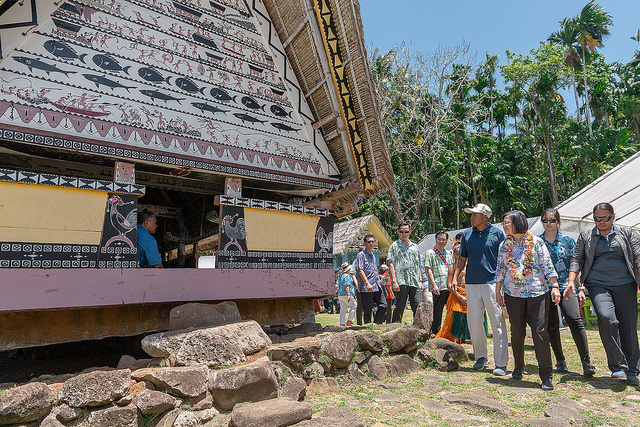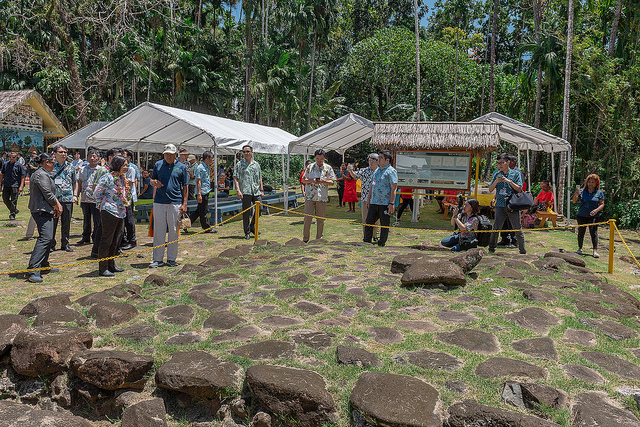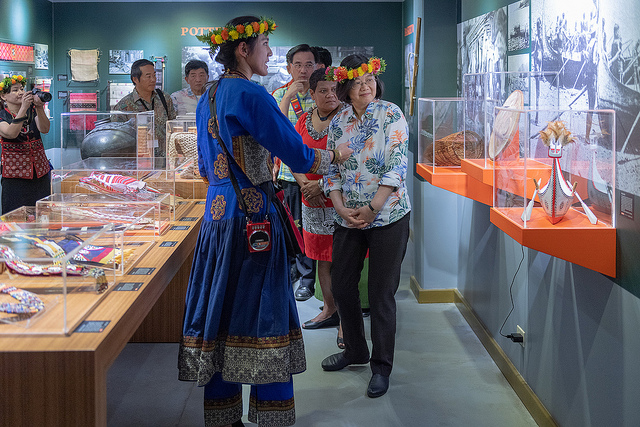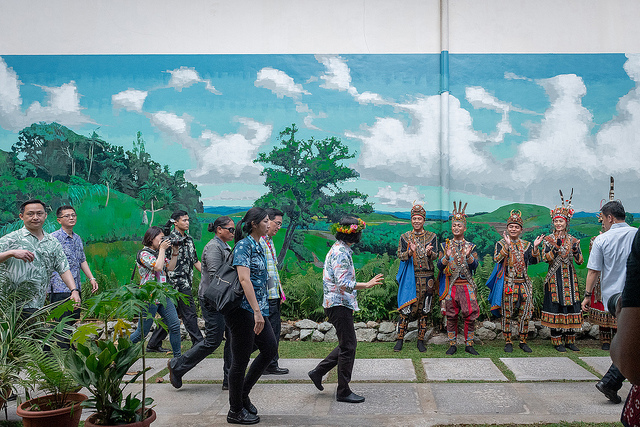News & activities
 News releases
News releases
On the afternoon of March 23 local time, President Tsai Ing-wen—who is currently on a trip to visit Palau, Nauru, and the Marshall Islands—visited Airai Bai and Belau National Museum to learn about Palau's Austronesian culture.
Women and outsiders are strictly prohibited from entering the Airai Bai, but the Airai State council of chiefs made a special exception by inviting President Tsai to the meeting house . She thus became the first foreign female head of state ever to enter there.
After President Tsai arrived at the Airai Bai, a man dressed in traditional Palauan garb blew on a conch to announce the arrival of an honored guest, then Mr. Ngiraibelas Tmetuchl, Chairman of the Palau Visitors Authority Board of Directors and 8th Chief of Airai State, outlined the history of the Airai Bai. After that, the 11th Chief opened the wooden door and invited President Tsai, Minister of Foreign Affairs Joseph Wu (吳釗燮), National Security Council Deputy Secretary-General Tsai Ming-yen (蔡明彥), and the other delegation members to enter and take seats. The 1st Chief and other chiefs welcomed them in, and the two sides engaged in brief conversation.
After leaving the meeting house, President Tsai and her delegation tasted some local Palauan cuisine and took in a traditional dance performance amidst a festive atmosphere.
The Airai Bai's foundation was constructed 300 years ago, and it serves primarily as a meeting house for Airai State's 10 traditional male leaders, one from each of its 10 tribes. Its main structure is made of wood, and its interior walls feature murals depicting historical scenes. In and around the entranceway there are many totemic figures, each with its own significance.
President Tsai and her delegation were then driven to the Belau National Museum, where they enjoyed a performance by an indigenous dance troupe from Taiwan, while Paiwan-style smoke signals announced the opening of a Taiwan indigenous peoples exhibit at the museum.
Icyang Parod (夷將‧拔路兒), Minister of the ROC (Taiwan) Council of Indigenous Peoples (CIP), then accompanied President Tsai in touring an exhibit on the handicrafts of Taiwan's indigenous peoples, which was just beginning that day at the museum's Taiwan Aborigines Exhibit, and which the CIP is helping to curate. Olympia E. Morei-Remengesau, Director/Curator of the Museum, gave a guided tour of the museum's Palau-related collections. Also, everyone had a lot of fun as they enjoyed a performance of local Palauan folk songs. A bit earlier, Minister Icyang Parod had witnessed the signing of an agreement for cultural cooperation between the CIP's Indigenous Peoples Cultural Development Center and the Belau National Museum, which aims to bring Taiwan's indigenous culture to our Palauan friends.
The Belau National Museum (BNM), which is located in Koror State on Palau's main island, has items dating as far back as the time of the first contacts with Western explorers in the 16th century. Its collection also includes many documents from the former Spanish, German, Japanese, and US rulers of the islands. BNM has sections focusing on Palau history, natural history, Taiwan's indigenous peoples, and contemporary topics. Outdoors, the BNM has a men's meeting house, a botanical garden, and items left from World War II.
Among those present at the activities were Palau Minister of State Faustina Rehuher-Marugg as well ROC (Taiwan) Minister of Foreign Affairs Joseph Wu (吳釗燮), National Security Council Deputy Secretary-General Tsai Ming-yen (蔡明彥), other members of the visiting delegation, and ROC (Taiwan) Ambassador to Palau Wallace M.G. Chow (周民淦).












